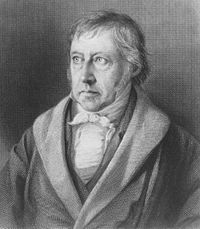UPDATE: Now almost 7 years since I first posted this @jasonstaples has offered a source for the earliest citation! I have to say, it is more concise than the source I cite below. [mfn]It really makes no sense in the context below which is about Plotinus and has the Hegel quote simply stuck in the middle of a section about Plotinus’ efforts to learn all he can of the philosophies of Persia and India. In fact, the more I look at it the more I think it must be an error. To place it in its fuller context,
The sacramental cult of Mithra could have had no attractions for Plotinus, who was no churchgoer, and shocked his friends by saying to them, It is for the gods to come to me, not for me to go to them.” [Note this stray close quotation mark.] “Das Denken ist auch Gottesdienst,” as Hegel said to his housekeeper. “The universal Power,” he says, “is within you. It has not to come and so be present with you; it is you that have turned away from it. It is there all the time; you are not far from it, but you have turned your face the other way.” But may he not have been attracted by Indian thought, which was fairly well known at Alexandria ? The Greeks had long been interested in the gymnosophists, who seemed to have solved the problem of invulnerability.
I suspect that somehow this snippet regarding Hegel was misplaced within this consideration of Plotinus. It still would be nice to know that author’s source for the additional quotation from Hegel.[/mfn] The citation is found in volume 1 of the “International Journal of Ethics,” October, 1890, January, April, and July, 1891. It is an article by J. H. Muirhead, “The Inner Life In Relation To Morality: A Study In The Elements Of Religion,” pp. 169-85.
It is related of the philosopher Hegel that his landlady, being much distressed at his irreligion, complained one Sunday morning that he did not go to divine service, to which the philosopher is said to have replied, “Das Denken ist auch Gottesdienst.” [mfn]p. 183[/mfn]
This is more in keeping with the way the story was related to us by our faculty guest (see below). “Thinking is also worship” seems a reasonable response in the context of this anecdote. The reason he does not go to “divine service” is because he is serving God right where he is so long as he is “thinking.” Of course it is still not the fully positive spin that was placed on it when I first heard the phrase cited in an InterVarsity meeting. For Hegel it seems more of an excuse to avoid services (and placate his housekeeper/wife’s(?) concerns) than an admonition to bring all our lives, thoughts included, into the practice of worshipping God. [mfn]The article in which this quote is found is quite interesting, if well outside my expertise. Muirhead states his thesis:
The pivot of this inner life [of a person] is the thought of himself as a part or member in a universal order.
My object in this paper is to answer the questions: 1, what this thought is, or ought to be; 2, what are some of the forms which the feeling it rouses takes; 3, what are some of its special relations to social morality; and 4, what practical means may be Suggested under modern conditions for the cultivation of it.
These efforts are put forward in a period of “transition” as society seeks to find a superstructure on which morality can be supported that is not religious faith (pp. 171-2). He makes some strong claims for and about morality independent of religion that I am sure my secular friends would and do embrace whole heartedly. Remember, this is 1890-1 and presumably his “agnostic” views were no doubt controversial at the time.[/mfn]
UPDATE 2: Jason had intended to send me a different source, one that is a few years older and has a first-person account of Hegel’s widow retelling of this phrase. In Philip Schaff’s History of the Christian Church, Volume 4 (copyright 1885) the author is discussing the theology of John Scotus Erigena (who wrote his work on predestination in 850) and notes that he considers Erigena “a forerunner of Scholasticism and Mysticism and in some respects of Spinoza, Schleiermacher, and Hegel.”
With him [Erigena] church authority resolves itself into reason, theology into philosophy, and true philosophy is identical with true religion. Philosophy is, so to say, religion unveiled and raised from the cloudy region of popular belief to the clear ether of pure thought.
At this point Shaff offers the following footnote:
So it was with Hegel. His pious widow told me that her husband often politely declined her request to accompany her to church, with the remark: “Mein liebes Kind, das Denken ist auch Gottesdienst.”
My prior remarks about Hegel’s remark would seem to hold as the context seems the same. He need not go to church because, as Schaff phrases it, “the clear ether of pure thought” is Gottesdienst.
So, what of my original reception of the quote and intended use for the presentation in 2010? It seems that if/when Hegel uttered the phrase it was not intended as encouragement to Christian intellectuals, rather the opposite, an elevation of his own philosophical musings to divine action itself. [mfn]I readily admit I may have Hegel wrong here, I know little about the man or his work beyond what has come to me through other scholars.[/mfn] In this case, I think a far more straightforward word of encouragement can be found in Scripture itself:
Col. 3:17 And whatever you do, in word or deed, do everything in the name of the Lord Jesus, giving thanks to God the Father through him.
Originally published on 15 October 2010.
I am doing a workshop tomorrow for a local, annual event called Faith4Thought. My topic is
Beyond Making the Grade
What do you take away from a college course – what gives it lasting significance or value? In a culture that claims to offer innumerable shortcuts to the easy A, what habits will help you maintain your integrity as you focus on lasting goals.
 When I was in college we had a faculty member come to our IV meeting and he shared the quote cited in the subject line, which was not attributed then, but I now know is attributed to Hegel. Now when this was presented to us back in the late 80’s the faculty member interpreted the quote in a very positive manner, suggesting that you do not have to be in an “official” capacity doing church work to still be serving and worshipping God. I thought I would riff off this quote for my talk, but I was surprised to find the context to suggest a different interpretation.
When I was in college we had a faculty member come to our IV meeting and he shared the quote cited in the subject line, which was not attributed then, but I now know is attributed to Hegel. Now when this was presented to us back in the late 80’s the faculty member interpreted the quote in a very positive manner, suggesting that you do not have to be in an “official” capacity doing church work to still be serving and worshipping God. I thought I would riff off this quote for my talk, but I was surprised to find the context to suggest a different interpretation.
“Das Denken ist auch Gottesdienst,” as Hegel said to his housekeeper. “The universal Power,” he says, “is within you. It has not to come and so be present with you; it is you that have turned away from it. It is there all the time; you are not far from it, but you have turned your face the other way.” [mfn]Philosophy, Vol. 10, No. 38 (Apr., 1935), pp. 144-153, Published by: Cambridge University Press on behalf of Royal Institute of Philosophy, http://www.jstor.org/stable/3746734[/mfn]
This is a very different reading than the one presented to us all those years ago. This is where I am asking for help. The above is the fullest citation of this story that I can find and yet the author does not cite his source. In fact, I cannot find any citation for the source, rather the story is simply repeated. Does anyone know the actual source or is this simply apocryphal (albeit in keeping with Hegel)?
Thanks!




3 thoughts on “Das Denken ist auch Gottesdienst”
My Quaker Friends would get a chuckle out of any requirement to serve as an official in order to do God’s work.